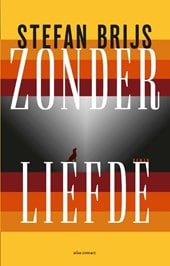‘Een manuscript wordt boos als je het alleen laat,’ stelde de Vlaamse romancier Stefan Brijs (Genk, 1969) ooit in een uitzending van Kunststof Radio, verwijzend naar zijn werkwijze. Brijs schrijft in lange, aaneengesloten perioden waarin de schrijver naar eigen zeggen zelfs geen boodschappen meer doet. Onlangs verscheen van Brijs, die internationaal doorbrak met De Engelenmaker (2006), zijn nieuwe roman Zonder liefde.
Paul is net verlaten door zijn vrouw, Ava heeft net haar vriend aan de kant gezet. Teleurgesteld in de liefde vinden de twee elkaar op een avond in een filmhuis en met de stekeligheid die op echte genegenheid wijst ontstaat er tussen hen een diepe, maar al snel ongelijkwaardige vriendschap. Sneller dan Paul het doorheeft voel je als lezer de liefde grondig uit de pas lopen. Er moet een derde persoon bij komen voordat Paul zelf doorheeft dat hij verliefd is geworden op Ava.
Focuskiller
De plot van Zonder liefde jaagt de lezer over de pagina’s, terwijl de taal toch weinig opmerkelijk of meeslepend is. Ook de buitenwereld is grotendeels afwezig: geen maatschappelijke observaties of stellingname. De aldus toneelmatig ogende setting van dit verhaal komt mededogen met de hoofdpersonages overigens wel ten goede. Louter de interactie tussen Paul en Ava stuwt de plot voort. Zelfs de smartphone is uit dit verhaal geschreven, wat Zonder liefde een prettig historische gloed geeft en op een radicaal statement van Brijs lijkt. Die afwezigheid van de focuskiller van deze tijd geeft te denken. Misschien is een smartphone voor een plot wel vergelijkbaar met een pistool – alleen inzetten als het echt niet anders kan.
Paul en Ava krijgen de aanduiding eind twintigers mee, maar komen eerder over als veertigers. Deze observatie komt van een veertiger, die terugverlangt naar eind twintig, toen het leven nog fundamenteel open lag. Ik betrapte mezelf tijdens het lezen meermaals op het uitroepen naar zowel Paul als Ava: ‘komaan, niet getreurd, zet jezelf eroverheen – alles is nog mogelijk!’
Alledaagse wreedheid
Zonder liefde doet denken aan de filmklassieker When Harry Met Sally (1989), over de mogelijkheid of onmogelijkheid van de platonische vriendschap. Alleen ditmaal zonder happy end. Bernard, de nieuwe liefde van Ava, heeft enigszins sinistere trekjes, wat deze roman aan het eind voor een kort moment de gedaante van een thriller geeft. Dat draagt prettig bij aan het ongeduld waarmee je door wil lezen en is ongetwijfeld bewust ingezet door de auteur.
De datingperikelen van Paul zijn heel schrijnend beschreven. Genadeloos is de achteloosheid waarmee Paul zich zonder veel geloof in de wereld van contactadvertenties stort. De nonchalance van zijn kant en hoe dat voor zijn twee dates fataal uitpakt, de alledaagse wreedheid daarvan trekt door de lezer als een migraine-aanval. Knap hieraan is dat noch Paul, noch Ava, noch de andere personages kwaadwillend zijn: je begrijpt als lezer alle posities, maar het loopt toch verkeerd af.
Beslissende details
Kortom: een roman als een klassiek noodlotsdrama. Waarin de bijfiguren helaas ietwat karikaturaal worden neergezet, ten bate van Paul en Ava die geloofwaardiger ogen. Zoals de dates van Paul worden getypeerd is wat al te eenvoudig – de een geeft om esoterische redenen Antoine de Saint-Exupéry’s De Kleine Prins cadeau (‘fout’, knipoogt de auteur richting lezer), de ander heeft thuis een plotvoorspellende reproductie van Hokusai’s The dream of the fisherman’s wife boven haar bed hangen (weer ‘fout’). Ik erger me aan de wijze waarmee deze personages zo worden afgeserveerd. Tegelijkertijd vormen die razendsnelle oordelen misschien ook precies de details waarmee het al dan niet slagen van een date wordt beslist.
De gewichtloosheid, of beter gezegd: ongezond onthechte wijze waarmee Paul door het leven stapt lijkt sterk op een depressie. Als Brijs met deze roman iets lijkt te willen zeggen is het misschien wel dit: liefde is onmogelijk temidden van het vacuüm van een depressie. Dat toch te pogen: daar komen alleen maar slachtoffers van.


